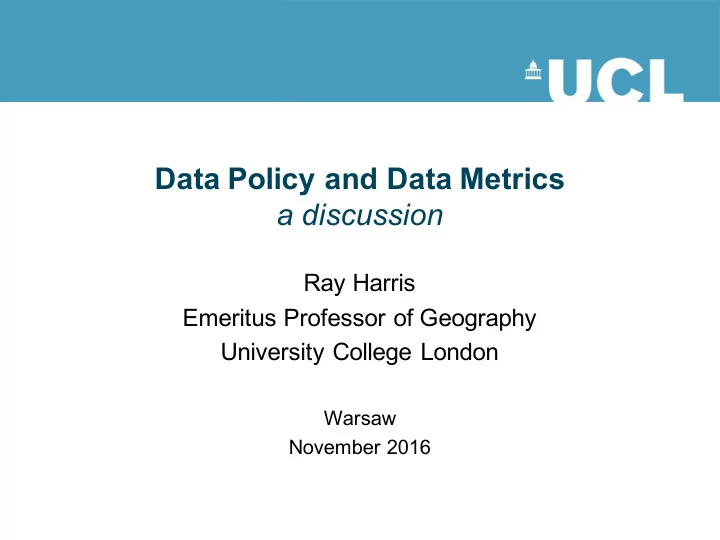

Data Policy and Data Metrics a discussion Ray Harris Emeritus Professor of Geography University College London Warsaw November 2016
Fourth paradigm • First Paradigm. Observation, description, experimentation. eg Ptolemy, Ibn Battuta. • Second Paradigm. Theoretical science. eg Newton. • Third Paradigm. Simulation and modelling. eg climate models. • Fourth Paradigm. Data-intensive science. eg International Virtual Observatory Alliance.
Agenda • ICSU and the World Data System (WDS) • Data publication • Open data
International Council for Science ICSU • 122 national scientific bodies representing 142 countries, e.g. • Polish Academy of Sciences • National Academy of Sciences, USA • Royal Society, UK • 31 international scientific unions, e.g. • International Astronomical Union • International Union of Crystallography • International Union of Geodesy and Geophysics
Brief World Data System history • Predecessor bodies WDCs and FAGS established 1957 (IGY) • ICSU Strategic Committees on Information and Data • World Data System established October 2008 • International Programme Office Tokyo March 2012
ICSU World Data System 100 members
Example WDS members • Antarctic Data, Hobart • Climate, Hamburg • Oceanography, Washington DC • Renewable Resources and Environment, Beijing • Solid Earth Physics, Moscow • International Laser Ranging Service • International VLBI Service for Geodesy and Astrometry
WDS Mandate Professional data management • Enable universal and equitable (full and open) access to quality-assured scientific data, data services, products and information • Ensure long-term data stewardship • Foster compliance to agreed-upon data standards and conventions • Provide mechanisms to facilitate and improve access to data and data products 7/12/20 15
Strategic Coordinating Committee on Information and Data • Recommendation 4: ICSU should engage actively with publishers of all kinds … to document and promote community best practice in the handling of supplemental material, publication of data and appropriate data citation. • Improve the process of creating data as a publication • Increased recognition • Behaviour modification • Potential role for legal deposit libraries
Data as a publication • CrossRef • DataCite • Elsevier • Springer Nature • Thomson Reuters e.g. Nature Extended Data Tables and Figures
Scholix Objective: move from to .. a one-for-all cross- a plethora of (mostly) bilateral referencing framework for arrangements between the articles and data different players…
Scholix Organizations are already starting to develop services that follow the Scholix framework: 1. OpenAIRE and PANGAEA Data-Literature Interlinking (DLI) Service 2. DataCite Event Data 3. Crossref Event Data and Linked Clinical Trials DLI: a prototype / demonstrator service developed by OpenAIRE with support from PANGAEA and the Data Publishing Services WG. Give it a spin: http://dliservice.research- infrastructures.eu
Open data • Open Knowledge Foundation • Open data is data that can be freely used, reused and redistributed by anyone – subject only, at most, to the requirement to attribute and share-alike • Panton Principles • By open data in science we mean that it is freely available on the public internet permitting any user to download, copy, analyse, re-process, pass them to software or use them for any other purpose without financial, legal or technical barriers other than those inseparable from gaining access to the internet itself
Many, many open data statements • Global Earth Observation Systems of Systems • Research Data Alliance • G8 Open Data Charter • European Union - the new gold • ICSU – open access
WDS data principles • Data, metadata, products and information should be fully and openly shared , subject to national or international laws and policies • Data, metadata, products and information produced for research, education and public-domain use will be made available with minimum time delay and free of charge • All who produce, share and use data and metadata are stewards of those data, and have responsibility for ensuring that the authenticity, quality and integrity of the data are preserved • Data should be labelled ‘sensitive’ or ‘restricted’ only with appropriate justification and following clearly defined protocols
Problems • Author recognition • Many open data policies exclude any warranty or liability of the public data owner regarding the availability, quality, accuracy and fitness for purpose of the data provided • Licences for data • e.g USA OMB Circular A-130 no licence for federally produced data • e.g. ESA Sentinel data licence • Exceptions • Foreign and national security • Defence • Legal reasons
Citation questions • How best to promote data citation and hence data metrics? • How to cite data formally and uniformally? • Comparison with a journal reference • Digital Object Identifier DOI • Research Gate and others • Is open data too variable to enter metrics? • How to cite derived data products from open data sources?
Conclusion • How to capture data use, especially with more and more open data? • How best to cite data?
Recommend
More recommend